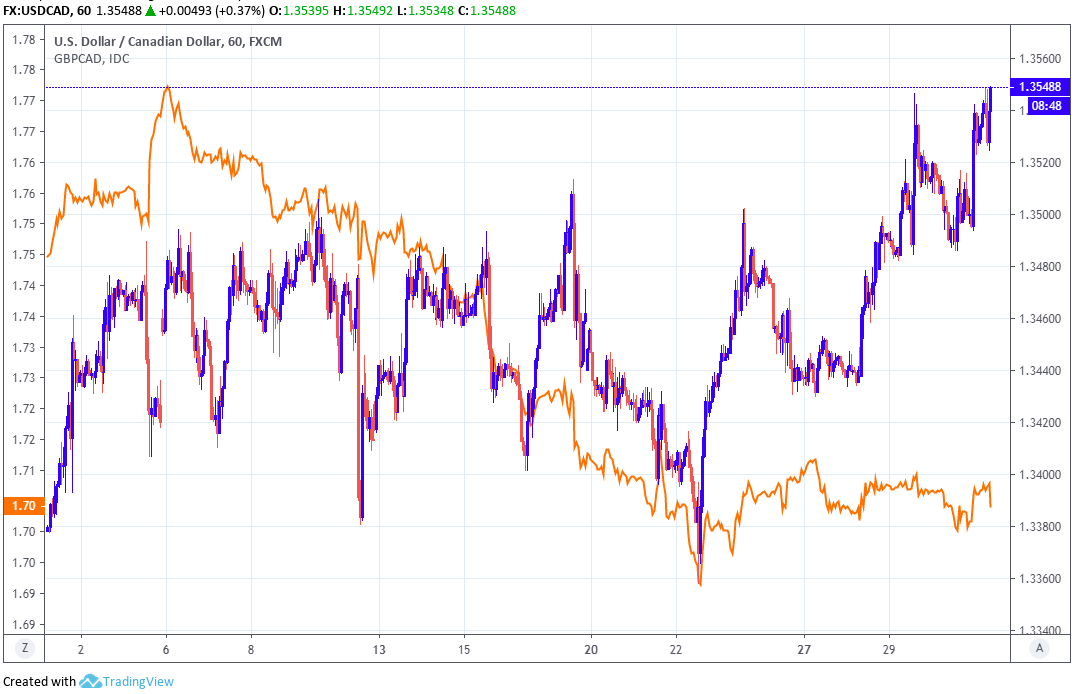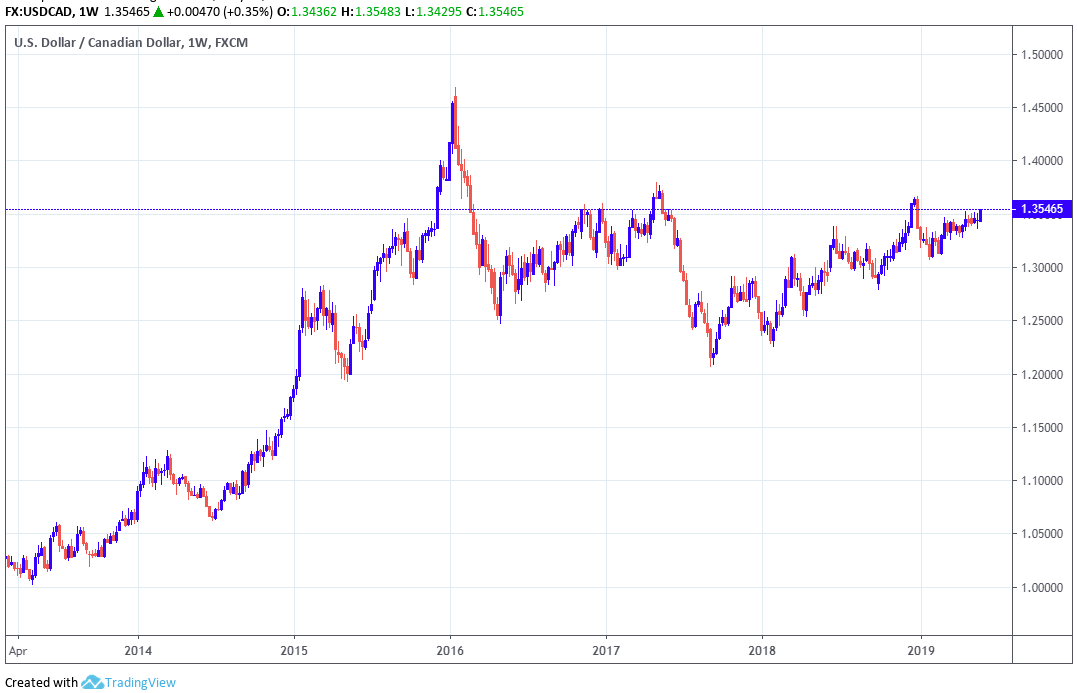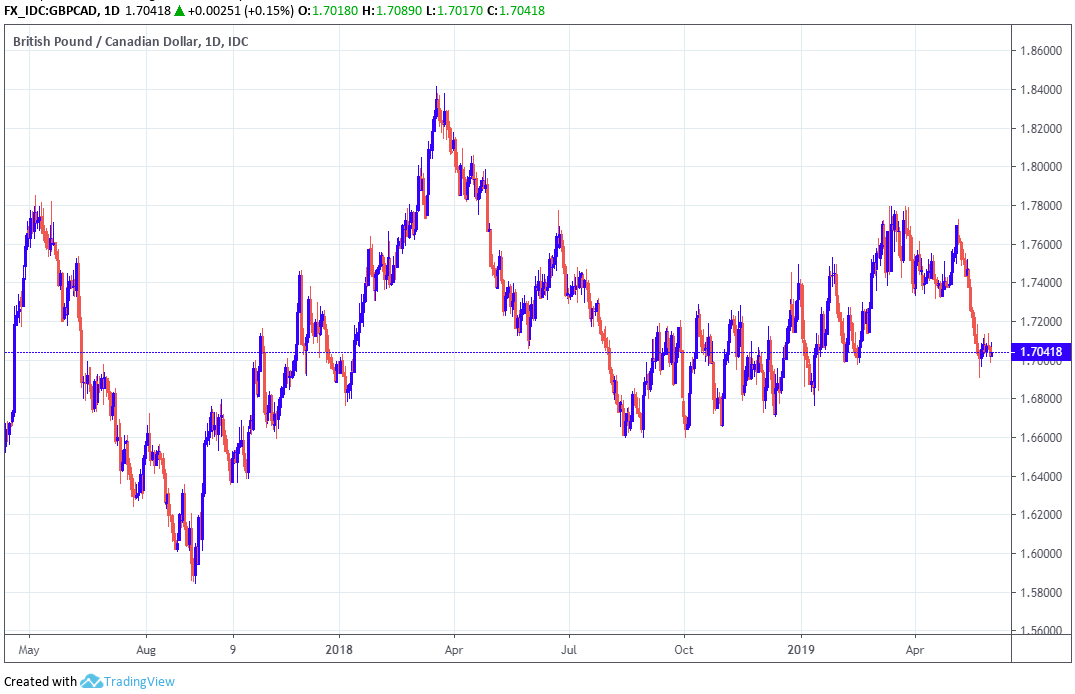Canadian Dollar Rocked after Trump's Tariff Threat to Mexico puts NAFTA 2.0 in Doubt
- Written by: James Skinner

Image © White House
- CAD slides after Trump announces Mexica tariffs over border dispute.
- Move could put ratification of USMCA into doubt, threatens CAD losses.
- Move offers GBP/CAD respite, but more losses ahead says Scotiabank.
The Canadian Dollar was on the ropes Friday after the White House threatened to impose tariffs on goods imported from Mexico, which is threatening the unratified update of the North American Free Trade Agreement (NAFTA) and offering the Pound-to-Loonie rate respite from relentless selling pressure.
Canada's Dollar was down across the board Friday after President Trump said that from June 10, a tariff of 5% will be applied to all goods imported into the U.S. from Mexico, citing illegal migration from Mexico into the U.S. as the reason behind the move.
....at which time the Tariffs will be removed. Details from the White House to follow.
— Donald J. Trump (@realDonaldTrump) May 30, 2019
Multiple so-called caravans of migrants have travelled from across South America in the past year, through Mexico and up to the U.S. border where they have attempted to gain legal or illegal entry into the country.
Trump has repeatedly called for Mexico to do more to prevent those 'caravans' from passing through its territory and now appears prepared to use coercive measures like trade tariffs to have the Mexican leadership fall into line.
Yesterday, Border Patrol agents apprehended the largest group of illegal aliens ever: 1,036 people who illegally crossed the border in El Paso around 4am. Democrats need to stand by our incredible Border Patrol and finally fix the loopholes at our Border! pic.twitter.com/6K1rIUzorM
— Donald J. Trump (@realDonaldTrump) May 30, 2019
"The announcement [removed] came just hours after Trump sent the USMCA’s “draft statement of administrative action” to Congress to officially kick off the 30 day window for approval under the TPA framework," says Tania Escobedo, a strategist at RBC Capital Markets. "Imposing these tariffs is in principle, not allowed under the free trade agreement currently in place between Mexico and the US or under WTO general frameworks. It is likely, however, that Trump will claim the measure is a matter of national security."
Thursday's move comes as lawmakers from the U.S., Mexico and Canada step up efforts to ratify the United-States-Mexico-Canada-Agreement (USMCA), which is an updated version of the NAFTA agreement.
Trump campaigned in the 2016 election on a pledge to renegotiate that trade pact and threatened to tear it up if different terms could not be agreed. A deal was struck in October 2018 after more than a year of negotiations, although it's still unratified by all signatories.
Jesus Seade, Mexico's chief negotiator, said Thursday the country has not yet spoken to the U.S. about the tariff plan but that it will retaliate aggressively if the levies do come into force.
"The escalating trade wars (ie, Mexico) won’t bode well CAD, one of the key G10 underperformers overnight," says Petr Krpata, a strategist at ING Group.

Above: USD/CAD rate shown at hourly intervals, alongside GBP/CAD (orange).
The U.S. is Canada's largest trade partner and any failure to ratify the new agreement could ultimately threaten at least some of that trade as it could mean tariffs are eventually imposed on goods coming from Canada too.
Conventional economic theory argues that Canada's Dollar would automatically depreciate in the event that tariffs become likely or are imposed, in order to rectify the international price distortion caused by the levies and to soften the blow for the Canadian economy.
TD Securities, a Toronto-headquartered investment firm, once argued that Canada's Dollar could fall by up to 20% if the trade negotiations failed and the NAFTA agreement was subsequently torn up by the White House.
"The renegotiated NAFTA agreement (“USMCA“) isn’t worth the paper it is printed on. Any assertions to the contrary on the part of the White House Chief of Staff stating “that is separate and apart from the USMCA” would be laughable – if these developments weren’t so sad. Anyone who is currently negotiating a trade agreement with the US or is going to do so in future will remember this episode," says Ulrich Leuchtmann, head of FX strategy at Commerzbank.

Above: USD/CAD rate shown at weekly intervals.
Fresh doubts over the ratification of the USMCA pact could provide relief to a beleaguered Pound-to-Canadian Dollar exchange rate, which has fallen 2.247% this month and contributed to Sterling losing its crown as the best performing currency in the G10 universe for 2019.
Pound Sterling has faced relentless selling pressure due to uncertainty over the UK's departure from the European Union. A dreaded 'no deal' Brexit is still a risk for financial markets only now, the exit process is also threatening a destabilising general election that could put opposition leader Jeremy Corbyn into 10 Downing Street.
However, on Friday, Canada's Dollar was also being dumped on the market by the bucketload due to the nation's own trade concerns, which are now acting as an offset to the Brexit process that's still weighing heavily on Pound Sterling. But some analysts say this newfound respite won't last for long.
"GBP/CAD is breaking down from its brief consolidation range and selling pressure is picking up as the GBP edges under 1.7020, as expected," writes Eric Theoret, a technical analyst at Scotiabank, in a note to clients Thursday. "Immediate risks lie to the downside and the flag pattern fits with our view that the medium to longer run risks are tilted to the downside for the GBP following the break under the base of the early 2019 range around 1.73."

Above: Pound-to-Canadian-Dollar rate shown at daily intervals.
There is now a Conservative Party leadership election underway in Westminster, with MPs lining up behind their preferred candidates in accordance with their shared views on Brexit as well as the pros and cons of a 'no deal' Brexit.
A ballot in parliament will whittle down a crowded field of candidates to just two before the sun sets on the month of June, with those remaining going through to a runoff vote among the grassroots.
Pound Sterling and financial markets would not take kindly to a 'no deal' advocate making it through to the final choice of two, as that candidate would be likely to win the ballot of party members and become the next Prime Minister.
A 'no deal' exit would would end the subordination of UK institutions to those of the European Union but mean defaulting to doing business with the bloc on World Trade Organization terms, which many say would be economically damaging. It would certainly be bad for the Pound.
Forecasts for Sterling in a 'no deal' scenario suggest the Pound would fall to as low as 1.10 against the U.S. Dollar which, when combined with Friday's CAD/USD rate of, would put the Pound-to-Canadian-Dollar exchange rate at 1.50, down from 1.70 Friday and representing a fall of 12%.
Time to move your money? Get 3-5% more currency than your bank would offer by using the services of foreign exchange specialists at RationalFX. A specialist broker can deliver you an exchange rate closer to the real market rate, thereby saving you substantial quantities of currency. Find out more here.
* Advertisement




